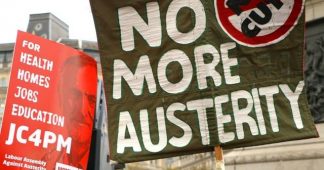REVELATIONS that Boris Johnson skipped five Cobra meetings looking at the growing coronavirus threat between January and March confirm the established view of the Prime Minister.
The “part-time PM” slammed by Jeremy Corbyn at the height of the February floods does not come out well from the Sunday Times investigation into Britain’s lack of preparedness for the pandemic.
But a narrow focus on the PM’s failure to preside over crisis committees as shown by Labour’s Jonathan Ashworth risks ignoring the deeper reasons why the NHS went into the pandemic without the resources to properly handle it.
A now notorious 2016 drill demonstrated to ministers that if a pandemic struck — and successive governments had affirmed that this was a real risk — the NHS would be overwhelmed, and in particular we would face severe shortages of personal protective equipment (PPE) and ventilators. Nothing was done.
Part of the reason was austerity, the axe taken to public services and local government by David Cameron and George Osborne, that saw budgets cut, PPE stockpiles allowed to go out of date and created a “permanent winter crisis” for the health service that meant pandemic contingency training was dropped for more immediate tasks.
Now, as public servants and communities engage in a desperate battle to overcome the chronic lack of resources bequeathed to us by 10 years of Tory and Liberal Democrat “belt-tightening,” the “all in it together” mantra those parties then mouthed sounds more hollow than ever.
Some of the negligence is ascribed to the 2016-20 governments having their hands full with Brexit, although as the Public & Commercial Services union repeatedly pointed out, the Tories declined to reverse sweeping Civil Service staffing cuts to prepare for that either.
The government’s failure to throw resources even at its political priorities is rooted in a cost-cutting culture that trade unions have long warned leaves services helpless in the face of any unexpected contingency.
The lack of any spare capacity has played havoc with our transport network, where a case of staff sickness can now see entire services cancelled, as well as with our NHS.
Ministers hint at a reckoning, whereby all the additional spending undertaken during the Covid-19 crisis is made up for in cuts. They may get away with it. In 2010 austerity began with a similarly misleading narrative.
This time the left has to fight harder for the widest understanding that this crisis does not make cuts inevitable — rather, cuts made this crisis inevitable. An entire economic model stands discredited by its inability to cope with coronavirus.
Over the last five years Labour relentlessly campaigned against the weakness and injustice of that economic model. Almost alone among major parties in Europe, it stood for a fundamental break with the politics of the status quo.
The full weight of the British state and Establishment was brought to bear to see off the challenge, including, as we have recently discovered, via internal sabotage.
Labour now faces legal action from some of those named in the infamous leaked report, as do some media outlets for reporting on it. Its new leadership has emphasised the damage done by the leak rather than the damage detailed in the leak.
Yet if the report had not been leaked, very important lessons on the nature of the resistance to the democratic socialist revival led by Jeremy Corbyn could have been buried forever.
That matters because the Covid-19 pandemic shows how necessary the socialist policies Labour fought two elections on are. The labour movement needs to oppose the party’s retreat from those policies.
Institutional antipathy to socialism within Labour itself clearly played a role in the defeat of the Corbyn project, and the left must take that into account in our strategies for socialist advance.











